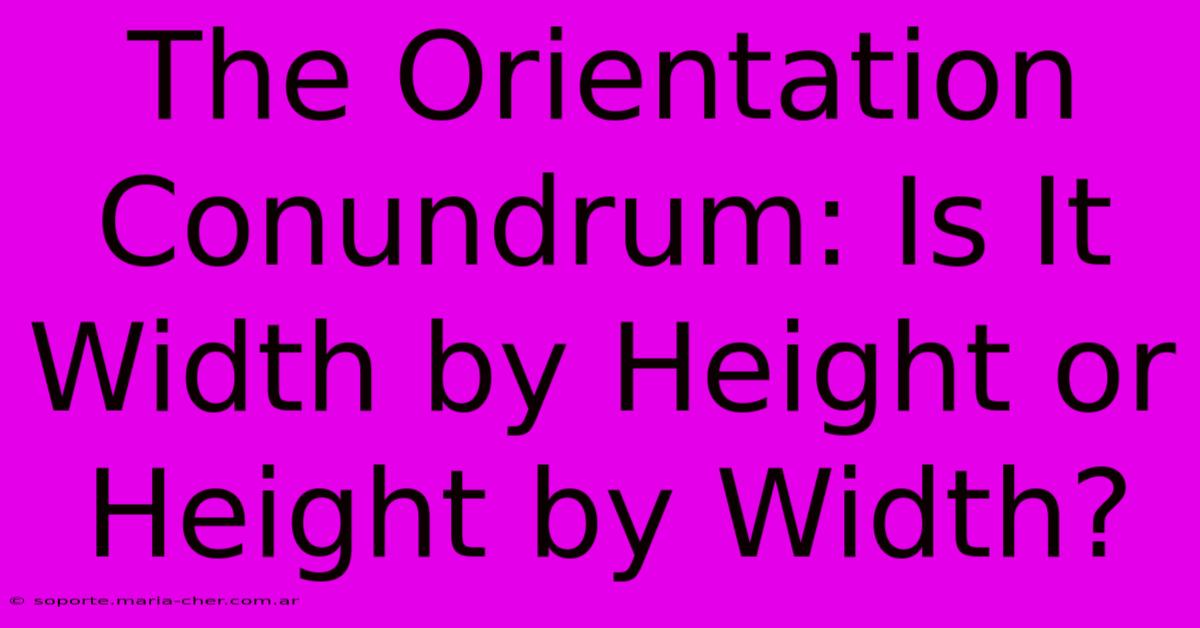The Orientation Conundrum: Is It Width By Height Or Height By Width?

Table of Contents
The Orientation Conundrum: Is It Width by Height or Height by Width?
The seemingly simple question of image orientation – width by height or height by width – is surprisingly complex. This seemingly minor detail can cause significant confusion across various platforms and applications, leading to misaligned images, incorrect scaling, and even frustrating workflow disruptions. Let's dive into this "orientation conundrum" and shed some light on the prevailing conventions and best practices.
Understanding Image Dimensions
Before we tackle the width vs. height debate, let's establish a clear understanding of what these terms represent.
- Width: The horizontal extent of an image. Think of it as the image's breadth.
- Height: The vertical extent of an image. This is how tall the image is.
When describing image dimensions, you're essentially stating the number of pixels along each axis. A 1920 x 1080 image, for example, has a width of 1920 pixels and a height of 1080 pixels.
The Standard Convention: Width x Height
The overwhelmingly accepted and preferred convention across almost all industries, including photography, graphic design, web development, and video production, is to list dimensions as width x height. This means you would write 1920 x 1080, not 1080 x 1920.
Why this convention? It's largely rooted in consistency and logical flow. We read from left to right, and width is the first dimension we perceive visually. Listing width first mirrors this natural reading pattern, making it easier to understand the image's proportions at a glance.
Exceptions and Ambiguities
While the width x height convention is the standard, there are exceptions and instances where the order might be reversed or unclear:
- Specific Software Applications: Some niche software or older systems might deviate from the standard. Always consult the application's documentation for clarification.
- Informal Communication: In casual conversations, the order might get flipped, especially when discussing general sizes rather than precise pixel counts. Context is crucial here.
- Data Storage and Metadata: In certain file formats or databases, the order might not be consistently specified. It's essential to carefully examine the metadata or documentation to ensure you understand how dimensions are stored.
Why Consistency Matters
Maintaining consistency in stating image dimensions is crucial for several reasons:
- Avoiding Errors: Incorrectly stating dimensions can lead to improperly scaled images, distorted aspects ratios, and ultimately, suboptimal visual results.
- Improved Communication: Using the standard convention ensures everyone involved understands the image's dimensions correctly, reducing the chance of miscommunication and errors.
- Streamlined Workflows: Consistent notation simplifies image processing, file management, and integration across different applications and platforms.
Best Practices for Image Dimension Handling
To avoid confusion and ensure smooth workflows, adhere to these best practices:
- Always use width x height: Make it your default and stick to it.
- Double-check your dimensions: Before using an image in any project, verify its dimensions are accurate and correctly reported.
- Consult documentation: When unsure, refer to the specific application's or platform's guidelines.
- Clearly communicate dimensions: Ensure that image dimensions are clearly indicated in project specifications, file names, and any relevant documentation.
Conclusion: Embrace the Standard
The seemingly trivial choice of width x height or height x width is anything but trivial. By adhering to the standard convention, you enhance clarity, prevent errors, and optimize your workflow. Embrace the width x height convention and minimize the "orientation conundrum" in your image handling processes. Consistency is key to success in image management.

Thank you for visiting our website wich cover about The Orientation Conundrum: Is It Width By Height Or Height By Width?. We hope the information provided has been useful to you. Feel free to contact us if you have any questions or need further assistance. See you next time and dont miss to bookmark.
Featured Posts
-
Natures Art Unboxed Secret Savings On Instagrammable Dried Flowers
Feb 08, 2025
-
Flower Power Unleashed Wholesale Babys Breath Blooms For Abundance
Feb 08, 2025
-
Unveiling The Secrets Of Breathtaking Bulk Dried Babys Breath A Floral Wonderland
Feb 08, 2025
-
Azures Heavenly Hues Unveiling The Magic Of Blue Roses
Feb 08, 2025
-
Unveil The Secret Language Of Roses What Your Bouquet Says
Feb 08, 2025
